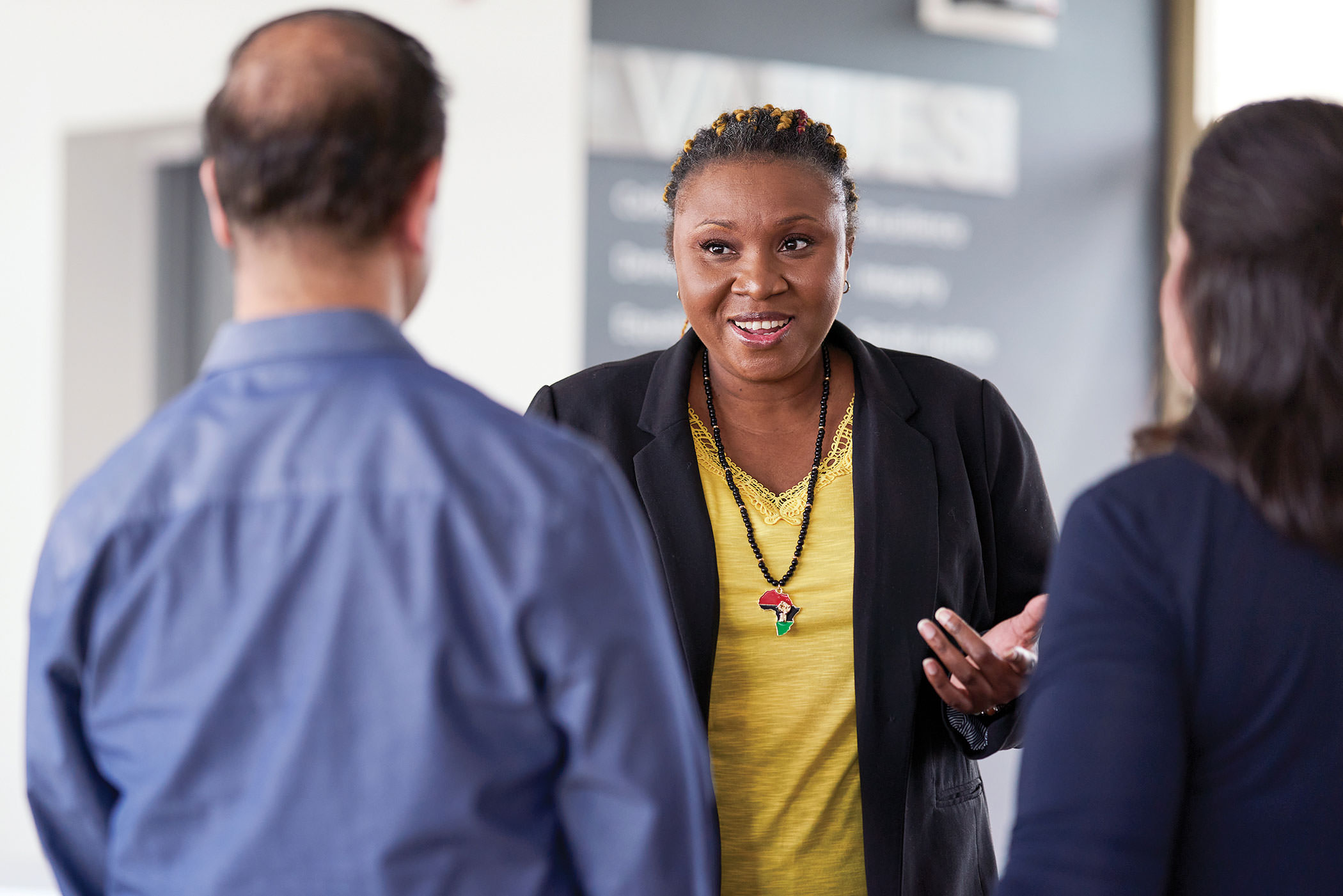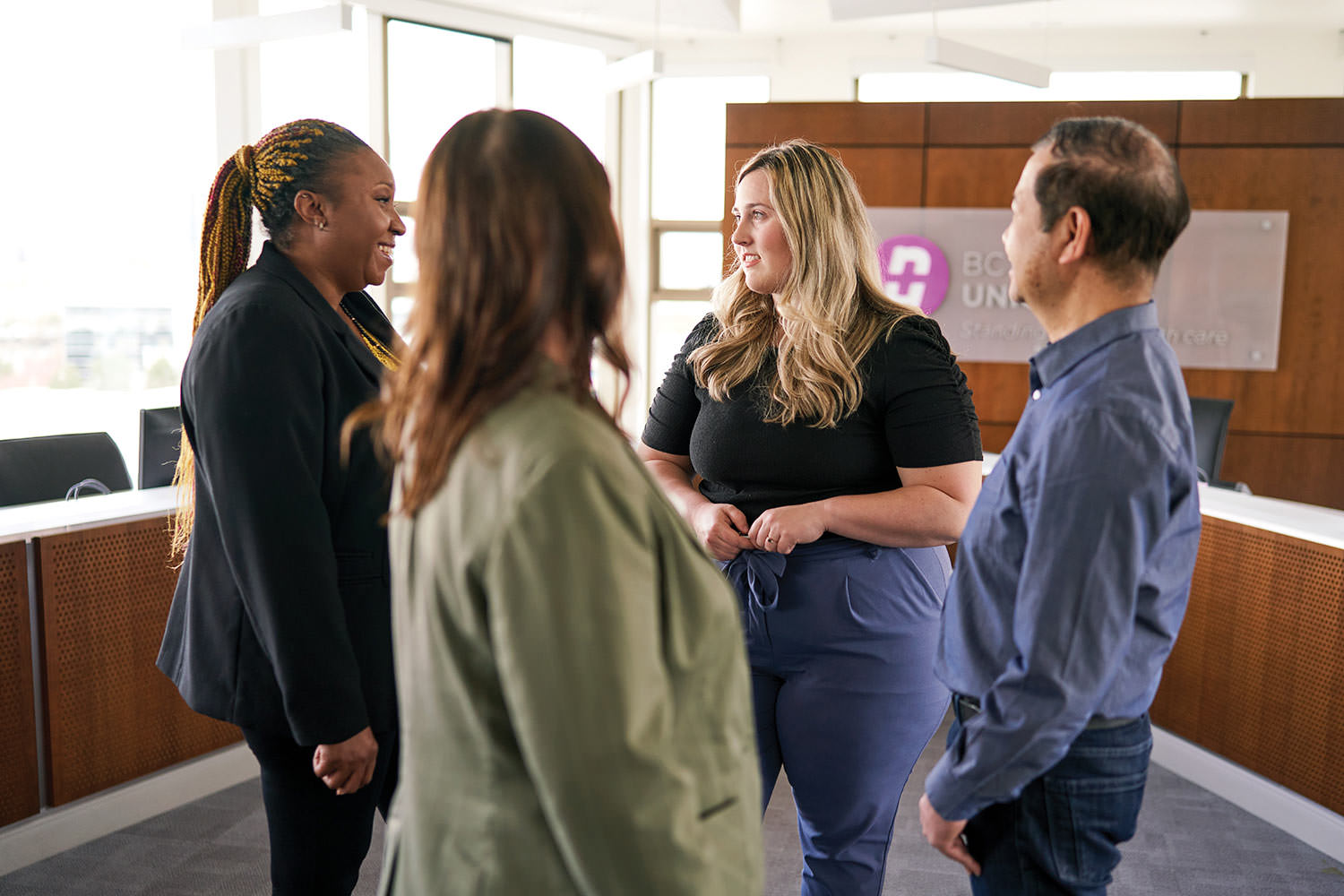TRACIA BATSON-DOTTIN IS UNSTOPPABLE IN HER FIGHT AGAINST SYSTEMIC RACISM AND BULLYING IN THE WORKPLACE.
She has experienced no shortage of racism in her career. But that hasn’t dampened her resolve to foster positive, healthy relationships with colleagues and make sure all nurses are treated with fairness and respect.
The Forensic Psychiatric Hospital (FPH) site-specific infection-control practitioner emigrated from Barbados to BC in 2009 to support an ailing family member.
“I’ve wanted to be a nurse as far back as I can remember,” she says. “I recall seeing nurses with their neat uniforms and how they always treated people with kindness and empathy. I was always playing nurse, always wanting to help people, and I knew that’s what I wanted to do with my career.”
The career vision of Batson-Dottin’s youth has not been reflected in her Canadian work environment.
“Unfortunately, I’ve experienced bullying, harassment, discrimination, and racism, all of which made me rethink my existence,” she reports. “I had to decide whether to accept things the way they were or fight back so no other nurse would have to go through what I did – and I chose to fight!”
That fight led Batson-Dottin to BCNU’s Mosaic of Colour Caucus. She first joined the group as representative for the Simon Fraser region and today holds the position of provincial chair.
One of four equity-seeking groups under BCNU’s human rights and equity umbrella, the caucus aims to be a safe and welcoming space for members of colour to support each other as they strive to create a more just and equitable union and health-care workplace.

Batson-Dottin fully embraces her role as the caucus’s provincial chair and uses her position to raise about racism and advocate for colleagues who experience bullying and discrimination at work.
In her own workplace, she helped head up the creation of a new Diversity and Inclusion Committee in 2021. Its aim is to educate all FPH staff about cultural sensitivity and promote a culturally safe working environment. The committee has organized several educational events and initiatives to foster cultural safety and celebrate diversity within the hospital.
Batson-Dottin is also a steward and member of her worksite joint occupational health and safety (JOHS) committee and serves as the mental health representative on the BCNU Simon Fraser region executive.
Her interest in psychological health and safety comes from the recognition that workers of colour and marginalized workers face a higher risk of psychological harm due to experiences of personal and systemic racism, discrimination and other forms of exclusion.
She says the FPH Diversity and Inclusion Committee is looking at ways to strengthen the employer’s respectful workplace policy, and her work on the JOHS committee has led to a draft site-specific anti-racism procedure to better address systemic issues and barriers to equity.

Batson-Dottin says collaborating with other members of colour and allies to promote equity still comes with risks. “Practising solidarity in the work environment can be difficult as it opens you up to retaliation and negative behaviours from those in leadership positions.”
She speaks from personal experience.
When FPH posted an internal position with potential for career advancement in 2016, Batson-Dottin was excited about the opportunity and quickly applied.
“Usually when a position is posted internally, those applicants are interviewed and considered first. But that was not the case, as an external applicant was interviewed before me even though I was the only internal applicant,” she recalls. “I felt something was not right.”
Her hunch that the employer already had someone else in mind was confirmed when she found out the position had been offered to the external applicant.
And that’s when she decided she needed help.
“With the support of BCNU steward, Suellen Larsen, I fought the decision for two years, and was told that, regardless of my case’s merits, proceeding to arbitration would likely result in a decision favouring the employer.”
She was undaunted.
“I asked, ‘so, you’re telling me that the system is rigged?’” she recalls.
But after Batson-Dottin decided to continue to arbitration, the employer suddenly changed its position and offered her the job.
Yet the ordeal continued.
“The applicant they first planned to hire was awarded another position, and from my first day this person basically terrorized me,” says Batson-Dottin.

“Eventually, this nurse and the manager who enabled the bad behaviour left the organization after were completed, and I hoped it was over.”
This was not the case, however. She says ongoing bullying, discrimination and harassment at the worksite forced her to submit five respectful workplace complaints over the next four years.
“As a victim of these negative behaviours for the last seven years, I bring relentlessness, determination, strength, passion and knowledge when facing these situations, regardless of potential retaliation.”
What keeps Batson-Dottin going?
“It can be daunting, but we all need to be allies,” she says. “I have been an ally to many nurses: Black, Indigenous, Filipino, South Asian, East Asian and white too, both in and outside my region.”
She says the Mosaic of Colour Caucus actively partners with the other groups that make up BCNU’s Human Rights and Equity Committee.
“We supported the Men in Nursing group in their fight to gain better parental leave language and this year we walked with Indigenous Leadership Circle members in the memorial march for missing and murdered Indigenous women and girls.
“We continue to support the LGBTQ Caucus, Workers with Disabilities Caucus and the Young Nurses’ Network by providing education to their members and at work sites.”
Batson-Dottin also recognizes and appreciates the contributions and hard work of all 14 Mosaic of Colour Caucus reps. “We have different ethnicities, but we all work together like a well-oiled machine with the same focus and goals.”
She firmly believes that, through allyship, the six BCNU human rights and equity groups can reach a wider audience.
“The BCNU human rights and equity groups fully support each other as a community and I could not have asked to work with a better group of individuals,” she says.
Together, she says they are a truly an unstoppable force.
